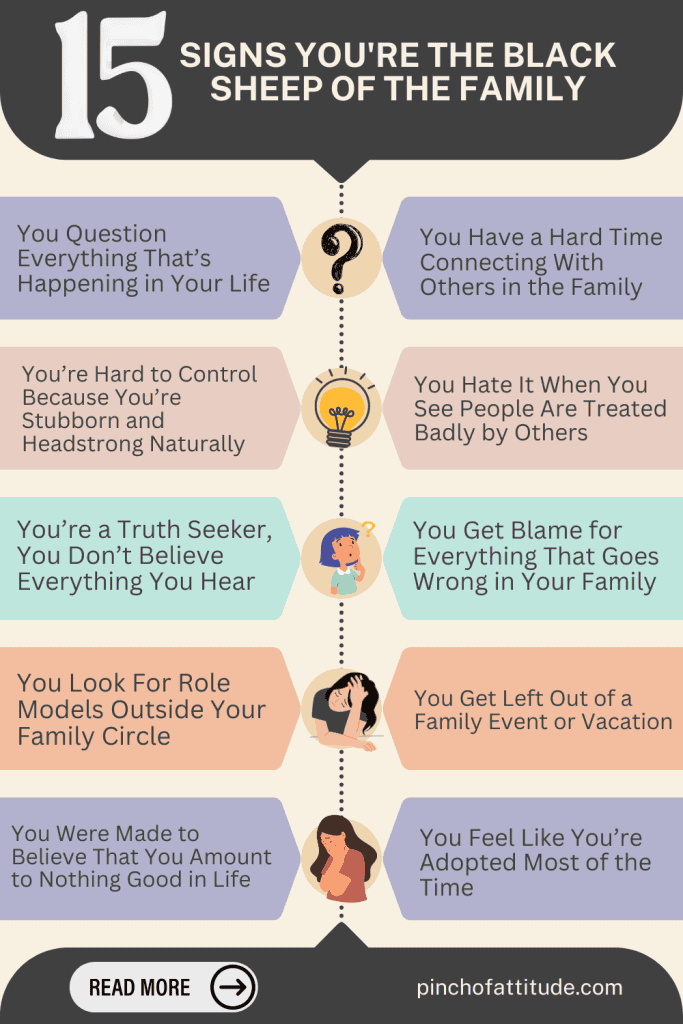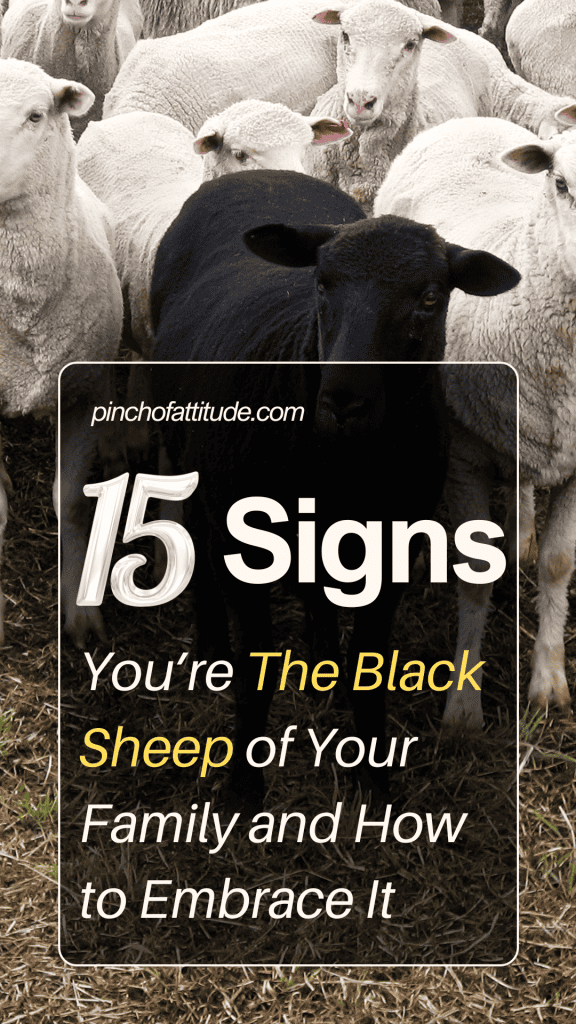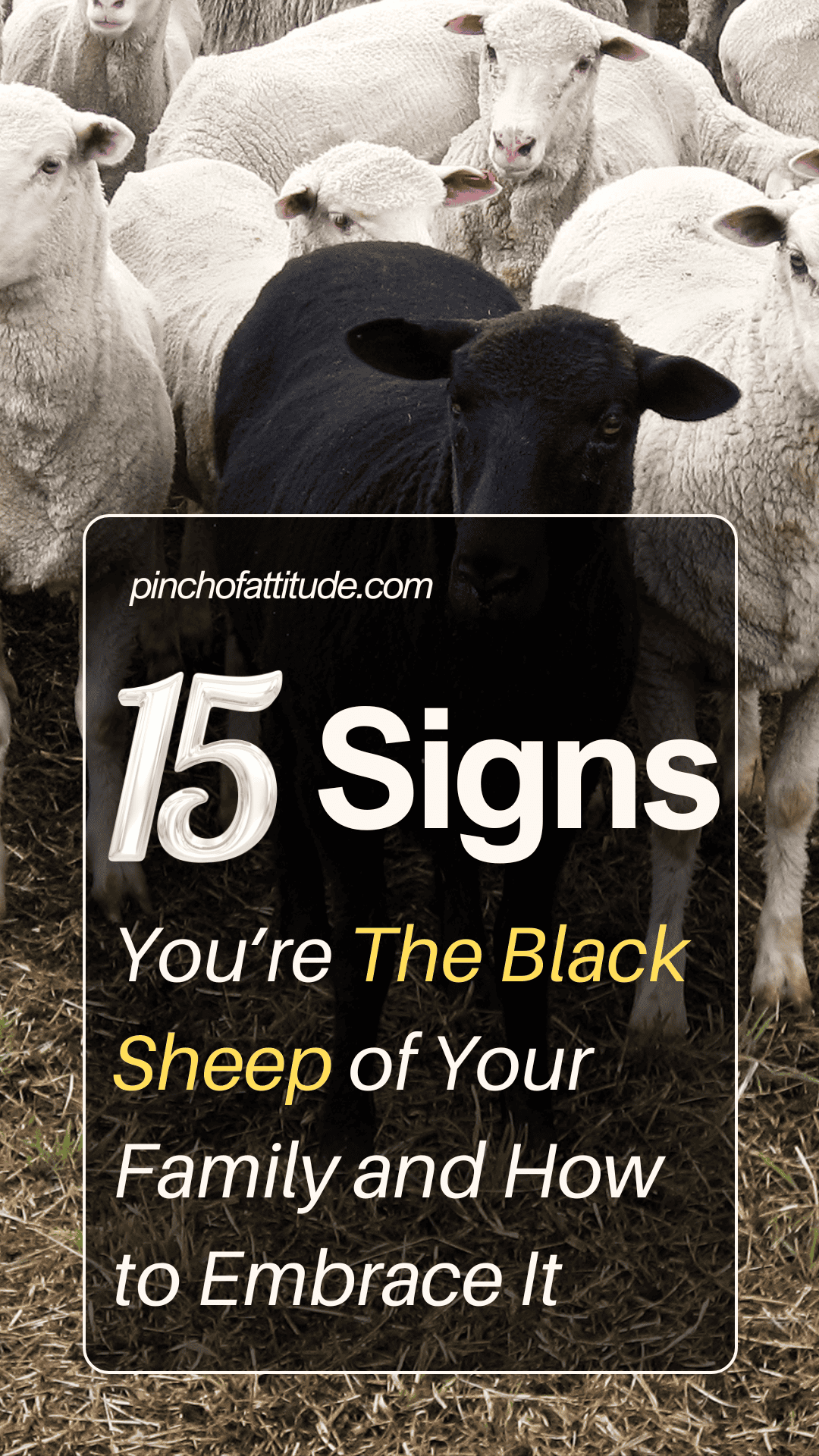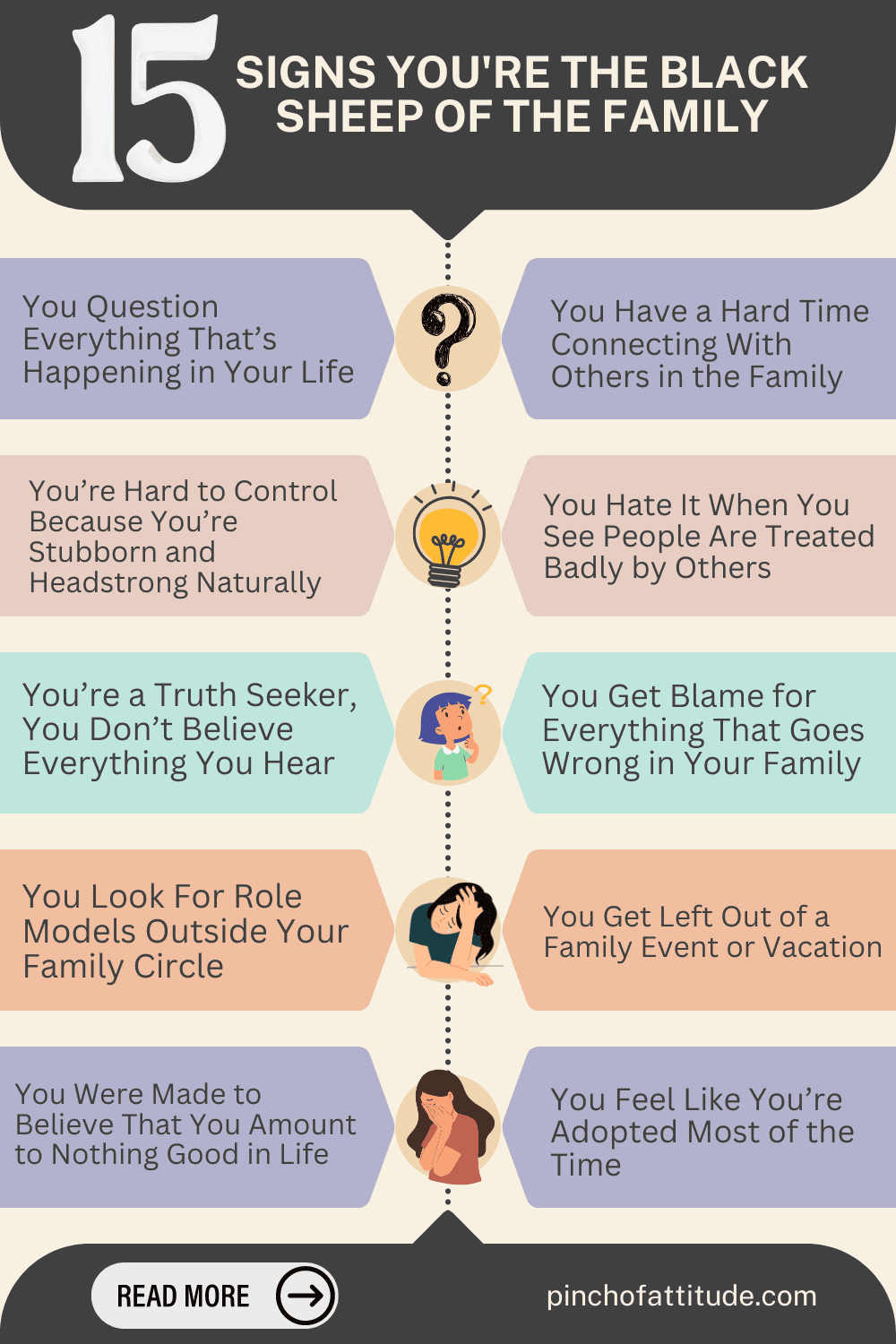Recognizing the signs you are the black sheep of your family can sometimes make it feel like a lonely path. But it is a journey that many of us walk with resilience and authenticity.
I’ve been there, and I understand the struggles and triumphs that come with embracing our unique traits amidst a sea of expectations.
But those differences we carry? They are not weaknesses but hidden strengths and I’m saying this with the utmost respect to what you’re going through right now.
Let me take you on a journey through my own experiences and how I stay true to myself despite living life as the black sheep of my family.
Through my story, I hope you’ll realize that your individuality is not something to hide but a source of empowerment.
- It’s very important that you embrace your individuality and question the status quo which can lead to profound insights and a richer understanding of yourself.
- Being stubborn and headstrong is a sign of your resilience and commitment to authenticity.
- Your inquisitive nature and quest for authenticity make you a truth seeker. While challenging accepted beliefs can set you apart.
Table of Contents
15 Signs You Are the Black Sheep of Your Family

Ever been to a family gathering where you can’t shake the feeling that you don’t fit in with the rest of your family? I remember one such occasion.
The air was filled with laughter and chatter, a familiar scene that should bring comfort.
But as I looked around, I couldn’t help but feel that they all shared a wavelength that I couldn’t quite tune into.
If that sounded like something you’ve experienced before, here are more signs you’re the black sheep in your family:
1. You Question Everything That’s Happening in Your Life
One of the unmistakable signs you’re the black sheep in your family is the tendency to question everything happening in your life.
I vividly recall moments around the family dinner table where discussions revolved around conventional topics and unquestioned beliefs.
And while others nodded in agreement, I couldn’t help but ask, “Why?”
This inquisitive nature, which led me to question traditions, expectations, and even societal norms, often set me apart.
My family seemed content with the status quo, while I hungered for a deeper understanding of everything that was happening.
If you’re constantly probing and seeking answers beyond the surface, you’re certainly not alone.
Welcome this curiosity. Being a deep thinker is a sign of your individuality and is an invaluable tool for self-discovery.
Your questions can lead you to profound insights and a richer understanding of yourself, even amidst the sea of conformity.
2. You’re Hard to Control Because You’re Stubborn and Headstrong Naturally
Do you have a natural sense of stubbornness and a headstrong determination? I’ve often found myself at odds with my family’s expectations because of this trait.
While they leaned towards tradition and conformity, oh boy! Did I stand my ground when my principles and beliefs were on the line?
This stubbornness, while sometimes seen as defiance, was actually a testament to my unwavering commitment to authenticity.
It’s not about resisting for the sake of it but rather about staying true to my values.
If you have also faced resistance for your strong-willed nature, look at it as a sign of your resilience and an essential aspect of what makes you, well, you.
Accept it wholeheartedly and let it guide you on your path of self-discovery and growth.
3. You’re a Truth Seeker, You Don’t Believe Everything You Hear
In my family, I’ve often found myself challenging accepted beliefs and not taking things at face value.
While others might readily embrace the status quo, I’ve been driven to dig deeper, to question, and to seek the underlying truths.
This quest for authenticity and deeper understanding can sometimes set you apart. Not everyone is comfortable with the uncomfortable questions you may ask.
But being a truth seeker is an invaluable quality, for it leads to genuine self-discovery and a richer, more authentic life.
4. You Look For Role Models Outside Your Family Circle

Growing up, I’ve often found inspiration and guidance from individuals beyond the confines of my immediate kin.
My family had their own set of values and expectations. However, I gravitated towards those whose beliefs and achievements resonated more closely with my own aspirations.
This can sometimes be seen as a sign of detachment or rebellion.
In truth, it is often a way to find like-minded individuals who share your vision and can provide the support and mentorship you crave.
It’s a testament to your desire for personal growth and authenticity, allowing you to forge your path based on your unique values and aspirations.
5. You Were Made to Believe That You Amount to Nothing Good in Life
One of the most painful signs of being the black sheep in the family is the belief instilled in you that you amount to nothing good in life.
This sign cuts deep, and it’s a sentiment I know all too well from my own experiences, particularly with my mother.
My mother’s unrealistic and beauty-centered values made her believe that unless you were born with a certain look, you were destined for failure.
She made it clear that my unconventional interests and non-conformity were perceived as shortcomings, and that I’d never measure up to her expectations of success.
It was a relentless message that weighed heavily on my self-esteem.
If you’ve been made to feel this way, remember, that it’s not a reflection of your worth but a consequence of unrealistic beliefs within your family.

6. You Have a Hard Time Connecting With Others in the Family
Being the black sheep in the family often means having a hard time connecting with others during family functions.
I’ve experienced this firsthand where I found myself feeling like an outcast, unable to bridge the gap between my interests and values and those of my family members.
Conversations revolved around topics I couldn’t relate to, and it became challenging to engage meaningfully.
The differences that set me apart became more pronounced during these moments, and I felt isolated.
It can be lonely at times, but it also offers a unique perspective and an opportunity to build connections beyond your family circle.
7. You Hate It When You See People Are Treated Badly by Others
Do you have a heightened sensitivity to witnessing others being treated poorly?
As an empath myself, I’ve always had a deep aversion to injustice and mistreatment, especially within my family.
When I witnessed someone being treated unfairly, it stirred strong emotions within me.
My family dynamics often revolved around hierarchies and favoritism, and as the black sheep, I keenly felt the weight of these.
I couldn’t stand by and watch as others were mistreated or overlooked, even if it meant going against the family’s grain.
This sensitivity is a sign of your empathy and integrity. It shows that your values prioritize fairness and compassion, even when it challenges family norms.

8. You Get Blame for Everything That Goes Wrong in Your Family
I’ve had my fair share of moments when mishaps or misunderstandings led to me shouldering the blame, regardless of my actual involvement.
It’s like being the family scapegoat, where even when you’re not involved, the finger somehow points your way.
This pattern can be frustrating, even disheartening.
But remember that it often stems from dysfunctional family dynamics and the need for someone to bear the burden of family issues.
It doesn’t define your worth or responsibility for every mishap.
Embrace your resilience in the face of unjust blame, and seek ways to assert your authenticity and boundaries with your family.
9. You Get Left Out of a Family Event or Vacation
Here’s another sign that hits home for many of us who bear the black sheep label.
There have been numerous occasions when it seemed like my family just assumed I was too busy to join in, as if I didn’t quite fit into their plans.
These moments of exclusion can sting, leaving you with a sense of being on the outskirts of your own family circle.
But it’s important to remind yourself that this isn’t a measure of your value or worthiness.
Instead, see them as opportunities to celebrate your uniqueness and explore connections and experiences beyond your family.

10. You Feel Like You’re Adopted Most of the Time
Ever felt like you come from an entirely different lineage, like an alien in familiar territory?
This feeling can be disconcerting as if you’re the puzzle piece that doesn’t quite fit the picture.
But remember, it’s a symptom of being authentically you in a family where norms and expectations may differ.
Welcome these moments as a testament to your individuality, a reminder that your distinct presence adds vibrant colors to the family tapestry.
11. You Think Differently and Always Know Who You Are

I’ve navigated through life with a distinct perspective and a clear sense of self, even when it seemed like conformity was the order of the day for my family.
This individuality means that you’re often charting your own course, guided by your values and beliefs, rather than following the crowd.
It is a challenging path, but it also ensures that you remain true to yourself, never losing sight of who you are at your core.
In the end, this steadfast self-awareness becomes a powerful compass, helping you live your life rich in authenticity and purpose.
12. You Love Being Alone and You’re Very Self-Sufficient
Personally, I’ve always cherished my alone time and prided myself on my self-reliance.
While my family leaned on each other for support, I found solace and strength in my independence.
Whether you’re pursuing personal projects, finding your own way through challenges, or simply enjoying the quiet moments, remember that self-sufficiency doesn’t mean isolation.

13. You’re Willing to Help Out Your Family, Always and in All Ways
Are you eager to lend a hand or provide support even if your family doesn’t always talk to you unless they need something from you?
This willingness to help comes from a genuine sense of care and concern. It demonstrates a desire to make a positive contribution, even when we don’t always see eye to eye.
If you identify with this trait, look at it as a means to build stronger connections within your family.
Your readiness to assist can be a powerful force for understanding, creating an environment where differences are celebrated, and love and support prevail.
14. Your Family Is Embarrassed to Introduce You at Any Event
I’ve personally felt the weight of this, where my family hesitated to introduce me at gatherings.
I recall a specific incident where we attended a family function, and as introductions began, there was an awkward pause when it came to me.
It was as though my family didn’t quite know how to present me to the extended family, given our striking differences in perspective and interests.
Experiencing such moments can be disheartening, but remember that your worth isn’t defined by others’ perceptions.

15. You’re Doing Better Than Your Other Siblings
It’s not uncommon for family members to raise eyebrows or express surprise when they witness your accomplishments.
I remember a moment when my career and personal achievements exceeded those of my siblings, sparking both pride and discomfort within my family.
This unexpected role reversal was met with mixed reactions, ranging from praise to envy.
Navigating this territory can be challenging, as it may introduce additional layers of complexity to the family dynamics.
However, it’s important to recognize that your accomplishments are a testament to your resilience and determination.
Continue to excel and, more importantly, stay true to yourself, even if it means blazing a different trail within your family.
What to Do When You’re the Black Sheep of the Family?

When you find yourself as the family’s black sheep, it’s important to focus on personal growth, maintain self-confidence, and nurture your well-being.
Here are my five ways to cope with being the black sheep:
- Embrace your authenticity: Recognize that being unique is a strength, not a weakness. Celebrate your individuality and stay true to your values and beliefs, even if they differ from your family’s.
- Seek support: Build a strong support network outside of your family circle. Friends, mentors, or support groups can provide emotional encouragement and understanding.
- Communication: Engage in open and empathetic communication with family members. Share your thoughts and feelings while being willing to listen to their perspectives as well. It can lead to better understanding and acceptance.
- Set boundaries: Set healthy boundaries to safeguard your emotional well-being. Clearly define what you’re comfortable with and what you’re not, and communicate these boundaries respectfully.
- Self-care: Prioritize self-care activities that promote mental and emotional well-being. Engage in hobbies, meditation, journaling, or therapy to manage stress and maintain balance.
How Does Being the Family’s Black Sheep Affect Your Mental Well-Being?

Being the family’s black sheep can have a profound impact on your mental well-being.
The constant feeling of not quite fitting in or being understood can lead to a range of emotions, including loneliness, isolation, and frustration.
What’s more, the pressure to conform to familial norms while maintaining your unique identity can create a sense of internal conflict and anxiety.
Below are some of the ways it can affect your mental health:
- Self-esteem and identity: Constant comparisons with siblings or other family members, as well as the perception of not meeting their expectations, can erode your confidence and self-identity. You might grapple with feelings of inadequacy or the belief that you’re somehow flawed.
- Stress and anxiety: The strain of navigating family gatherings or interactions where you feel like the odd one out can lead to heightened stress and anxiety levels. Also, the fear of judgment or criticism from family members can trigger emotional distress.
- Resilience and growth: On the flip side, overcoming the challenges of being different can build emotional strength and adaptability. It can lead to a deeper understanding of your own values and convictions, ultimately contributing to improved mental well-being.
To address these negative effects on your mental health, seek support from friends, mentors, or therapists who can provide emotional validation and guidance.
Engaging in self-care practices, setting healthy boundaries, and having open communication can also contribute to maintaining better mental well-being as the family’s black sheep.
Related Posts:
- When the Black Sheep Walks Away: One of the Best Decisions I’ve Ever Made
- The Black Sheep of the Family: Why I’m So Thankful for Being One
- I Was the Black Sheep of the Family and How I Got Out and Win!
- Why Am I the Black Sheep of the Family? And Why I Don’t Allow It to Define Me
- When The Black Sheep Becomes Successful: I’m Not Sorry About it! Nope
Frequently Asked Questions
What are some of the signs that you’re the black sheep of your family?
If you constantly question everything, have a stubborn nature, seek truth beyond face value, find role models outside your family, or are made to believe you amount to nothing, you might be the black sheep in your family.
How can being the black sheep affect your mental well-being?
You can face feelings of loneliness, isolation, low self-esteem, and stress. The pressure to conform can lead to anxiety, but there’s also potential for resilience and growth.
How can you cope if you’re the black sheep in your family?
You can cope with being the black sheep in your family by starting to embrace your authenticity, seek external support, communicate openly with your family, set clear boundaries, and prioritize self-care for mental and emotional balance.
Is being the black sheep necessarily a bad thing?
No, while it can come with challenges, being the black sheep can be a blessing in disguise. It can lead to personal growth, resilience, and a stronger sense of individuality.
What should you remember if you feel you’re the black sheep?
That your worth isn’t defined by other’s perceptions, and being different can be a path to self-discovery and authenticity.




